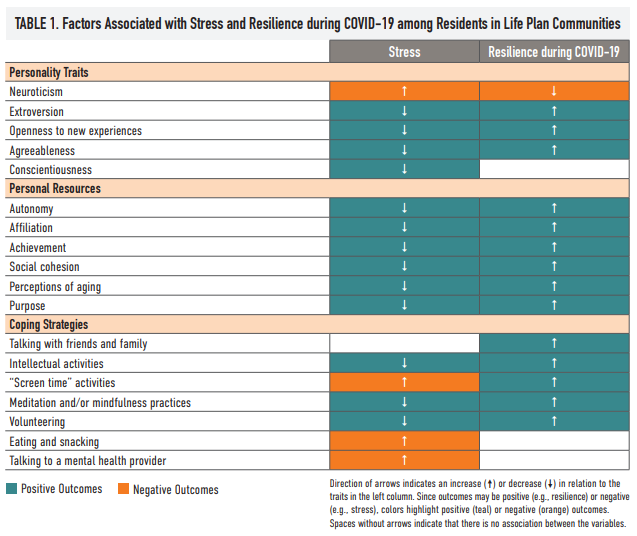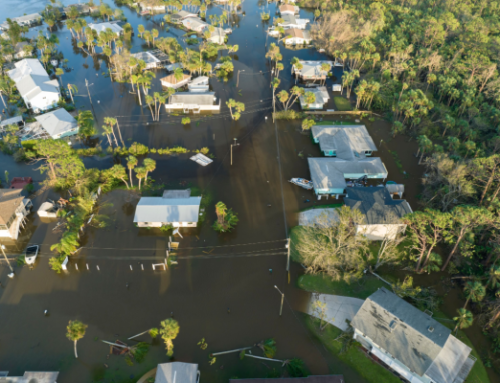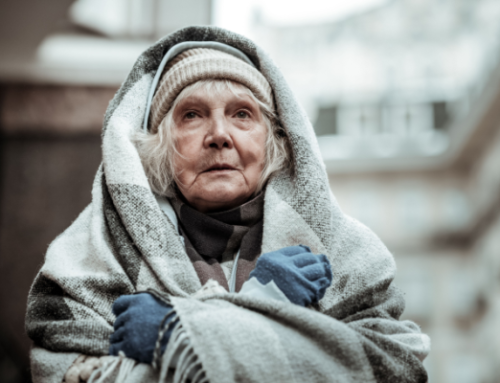As the COVID-19 pandemic now stretches into its third year, we are closing in on a staggering 1 million American deaths. Throughout this ordeal, older people have been most severely hit by the illness. But in a cruelly ironic twist, many seniors also suffered as a result of some of the measures put in place intending to keep people safe. It’s been a time of high stress, but interestingly, according to a recent study, the pandemic also has showcased seniors’ resiliency.
The Age Well Study
Chicago-based Mather is a non-denominational not-for-profit organization that focuses on improving the lives of older Americans. In addition to providing neighborhood-based programs and no-membership-required senior “gathering place” cafes around the Windy City, they also operate an independent living rental community and two continuing care retirement communities (CCRCs, or life plan communities).
As part of their mission to help seniors, Mather founded the nationally recognized Mather Institute, which spearheads nationwide research on senior living residents and community-residing older adults. They have partnered with several healthcare organizations, universities, and community groups across the country in their research endeavors.
Beginning in 2018, Mather Institute teamed with researchers at Northwestern University in Chicago to launch their groundbreaking Age Well Study. Using a yearly survey, this five-year longitudinal study collects CCRC residents’ self-reported health and wellness metrics, examining the impact of living in a CCRC including residents’ cognitive, physical, and psychosocial health, and overall well-being,
These results are compared to a demographically similar control group of “community-dwelling” seniors (people who are not living in a CCRC; may be home-based or live in another type of community) using data derived from the Health and Retirement Study (HRS), conducted by the Institute for Social Research at the University of Michigan.
A total of more than 5,700 residents from 122 CCRCs across the country have participated in this study, which focuses on a different topic each year.
>> Related: New Study Shows CCRC Residents ARE Happier and Healthier
Enduring stress, showing resilience
Year 4 surveys, the most recent installment of the longitudinal Age Well Study, were completed in January through May of 2021 and focused on CCRC residents’ stress and resilience during the pandemic.
Demographically, the Year 4 respondents were a bit homogeneous. More than half (55 percent) were age 85+ , two-thirds (67 percent) were women, more than half (62 percent) identified as Protestant, and the vast majority (98 percent) were Caucasian. Half were married (49 percent) and a third (39 percent) were widowed. Three-quarters (77 percent) had either a bachelor’s degree or higher, and over half (55 percent) reported an annual household income of $100,000+. The respondents were fairly evenly distributed across the country.
The Age Well researchers explored various aspects of CCRC resident stress and resilience during the pandemic including individual characteristics (personality, personal resources, demographics), social relationships, and coping strategies. The findings were perhaps a bit surprising…
When breaking down stress and resilience by factors like personality traits, personal resources, and coping strategies, CCRC/life plan residents had positive outcomes in nearly every category (see Table 1). The only factors associated with higher stress and/or lower resilience outcomes were among those with neurotic personality traits, and those who used “screen time” activities, eating/snacking, and talking to a mental health provider as a coping strategy.

Image source: Mather Institute, The Age Well Study – Year 4 Report
You can download a full breakdown of the Year 4 Age Well Study findings here.
>> Related: Lessons in Resiliency from Senior Living Communities
CCRC residents continue to thrive amid adversity
Nearly everyone — regardless of demographic traits — has experienced some level of stress over the past two years. Whether those anxious feelings were rooted in concerns about your own health or a loved one’s, finances, or some other issue created by the pandemic, tensions have definitely been running high for a lot of folks. Add to that equation potential feelings of loneliness and isolation created by pandemic precautions, and you have the perfect conditions for stress to brew.
As we discussed, seniors have been perhaps most impacted by some of the challenges set in motion by the pandemic, and there’s no doubt that many seniors have felt some level of anxiousness, as well as loneliness, ranging from mild to extreme. Interestingly though, as shown by the Age Well Study’s findings, it seems that seniors who have opted to live in a CCRC have actually fared well overall when it comes to stress during the pandemic, displaying a high level of resilience.
Another study’s results back this up. A 2021 survey of 64,000 senior living residents and their family members found that just 20 percent of residents of senior living communities (which would include CCRCs as well as other types of senior living) said they were suffering from severe loneliness. That is actually a lower number than a survey conducted before the pandemic, which found that 27 percent of senior living residents felt severely lonely.
>> Related: Is the Pandemic’s “Severely Lonely” Senior Living Resident a Myth?
Learning from seniors’ example
Seniors often must endure stressors that could have a negative impact on their physical and/or mental wellbeing such as age-related conditions, illnesses, or the death of loved ones. And yet, even in the face of this adversity, many older people are able to maintain their overall health and happiness. Some research has theorized that this is because seniors demonstrate characteristics of resilience, which is protective from the negative mental and physical health consequences of such stressors.
In this respect, maybe seniors as a group — especially those living in a senior living community like a CCRC — were better equipped than others to handle the stress that the pandemic has presented. In addition to living in a safe, nurturing environment, perhaps over the years, they have honed the psychological and behavioral skills — including personality traits, personal resources, social supports, and coping strategies — needed to survive these difficult times.
This inclination toward resiliency may be yet another life lesson that younger generations would be well-served to learn from their elders.

FREE Detailed Profile Reports on CCRCs/Life Plan Communities
Search Communities






